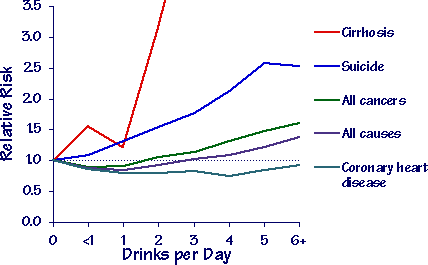But I Heard Drinking Was Good for My Health!
In 1991, the CBS news program 60 Minutes ran a story called “The French Paradox” which suggested that drinking alcohol, or at least red wine, reduced the risk of heart disease. Many people considered this a medical recommendation to drink.
Epidemiological studies indicate that moderate drinkers live longer than non-drinkers and heavy drinkers. The reasons are not clear.
In 2001, researchers at the Harvard School of Public Health and Brigham and Women’s Hospital have found that moderate alcohol consumption among people who have a specific version of a gene that metabolizes alcohol have a greater reduction in risk of heart disease and higher HDL (good cholesterol) levels (read story). In addition, other Harvard researchers found that people with heart disease who consume an average of 14 alcoholic drinks a week appear less likely to die from a heart attack than nondrinkers.
The Harvard scientists caution that heavy consumption of alcohol can lead to negative cardiovascular outcomes such as high blood pressure, heart attacks, and sudden cardiac death. Other doctors warn that even moderate drinking may raise the risks of colon and breast cancer, some types of stroke, fetal damage, driving accidents, abusive behavior, and criminal activities.
What is moderate drinking?
The U.S. Department of Agriculture and Department of and Health and Human Services define moderate drinking as no more than:
- one drink a day for women and people over 60
- two drinks a day for men (no more than one an hour).
They recommend the following people should not drink at all:
- women who are pregnant or trying to conceive
- people who plan to drive or engage in other activities that require attention or skill
- people taking medication, including over-the-counter medications
- individuals recovering from alcohol use disorder
- people under the age of 21.
A daily rather than weekly amount is suggested. It’s healthier to drink a small amount daily than to binge (5 or more drinks for men, 4 or more for women) on weekends or special occasions.
Health benefits of moderate drinking
|
Health risks of moderate drinking
|
A Study on Drinking and Health Risks
While drinking can lower the risk of cardiovascular disease, it does increase other health risks. In the following chart, mortality rates for non-drinkers serve as the baseline health risk (1.0 on the vertical axis). The risk for coronary heart disease even for heavy drinkers remains below the baseline; but risk of death from other causes goes up. The risk of death from liver disease skyrockets off the chart after only a couple of drinks a day.

Source: Bofetta, P, and Garfinkel, L. “Alcohol drinking and mortality among men enrolled in an American Cancer Society prospective study.” Epidemiology 1:342-348, 1990.
